| Listing 1 - 10 of 11 | << page >> |
Sort by
|
Book
ISBN: 9780691143576 0691143579 9786612976377 1782685553 1400838029 1282976370 9781400838028 Year: 2011 Publisher: Princeton, N.J. Princeton University Press
Abstract | Keywords | Export | Availability | Bookmark
 Loading...
Loading...Choose an application
- Reference Manager
- EndNote
- RefWorks (Direct export to RefWorks)
In this brief and incisive book, Pulitzer Prize-winning historian Garry Wills tells the story of the Confessions--what motivated Augustine to dictate it, how it asks to be read, and the many ways it has been misread in the one-and-a-half millennia since it was composed. Following Wills's biography of Augustine and his translation of the Confessions, this is an unparalleled introduction to one of the most important books in the Christian and Western traditions. Understandably fascinated by the story of Augustine's life, modern readers have largely succumbed to the temptation to read the Confessions as autobiography. But, Wills argues, this is a mistake. The book is not autobiography but rather a long prayer, suffused with the language of Scripture and addressed to God, not man. Augustine tells the story of his life not for its own significance but in order to discern how, as a drama of sin and salvation leading to God, it fits into sacred history. "We have to read Augustine as we do Dante," Wills writes, "alert to rich layer upon layer of Scriptural and theological symbolism." Wills also addresses the long afterlife of the book, from controversy in its own time and relative neglect during the Middle Ages to a renewed prominence beginning in the fourteenth century and persisting to today, when the Confessions has become an object of interest not just for Christians but also historians, philosophers, psychiatrists, and literary critics. With unmatched clarity and skill, Wills strips away the centuries of misunderstanding that have accumulated around Augustine's spiritual classic.
Augustine of Hippo --- Christian saints --- Biography --- History and criticism. --- Augustine, --- Augustine. --- Augustine, --Saint, Bishop of Hippo. --Confessiones. --- Christian saints - Algeria - Hippo (Extinct city) - Biography - History and criticism. --- Christian saints - Algeria - Hippo (Extinct city) - History and criticism. --- Christian saints --Algeria --Hippo (Extinct city) --Biography --History and criticism. --- Religion --- Philosophy & Religion --- Christianity --- Saints --- Canonization --- RELIGION / Christianity / History. --- Academic skepticism. --- Adolf von Harnack. --- Ageless Wisdom. --- Anguish. --- Asceticism. --- Astrology. --- Augustine of Hippo. --- Autobiography. --- Being and Time. --- Bible. --- Bildungsroman. --- Book of Confessions. --- Book. --- Celibacy. --- Christian. --- Christianity. --- Church Fathers. --- Confessions (Augustine). --- Consciousness. --- Consecration. --- Creation myth. --- Criticism. --- Dasein. --- Donatism. --- Ecclesiology. --- Edmund Husserl. --- Examination of conscience. --- Existentialism. --- Explanation. --- Facsimile. --- False prophet. --- Forgetting. --- Gervasius and Protasius. --- Gifford Lectures. --- God. --- Goethe's Faust. --- Hannah Arendt. --- Hedonism. --- Henri Bergson. --- Hierius. --- His Family. --- Historicity. --- Historiography. --- Jacques Derrida. --- Jean-François Lyotard. --- Jean-Jacques Rousseau. --- John Colet. --- Late Antiquity. --- Lecture. --- Ludwig Wittgenstein. --- Manichaeism. --- Marian devotions. --- Martin Heidegger. --- Narrative. --- Neoplatonism. --- Noam Chomsky. --- On Memory. --- On the Trinity. --- Oral tradition. --- Parchment. --- Paulinus of Nola. --- Pelagianism. --- Pelagius. --- Perversion. --- Phenomenon. --- Philosopher. --- Philosophy. --- Plotinus. --- Postmodernism. --- Predestination. --- Psalms. --- Psychobiography. --- Rebecca West. --- Rebuke. --- Religion. --- Religious text. --- Renunciation. --- Rhetoric. --- Romanticism. --- Rundown (Scientology). --- Saint Monica. --- Scholasticism. --- Septuagint. --- Sermon. --- Shorthand. --- Simplician. --- Specific gravity. --- Superstition. --- Søren Kierkegaard. --- Tanakh. --- The Christian Community. --- The First Man. --- Theft. --- Theology. --- Thomas Aquinas. --- Thought. --- Thérèse of Lisieux. --- Treatise. --- Valentinian (play). --- Writing.
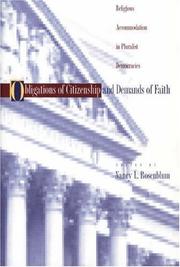
ISBN: 069100708X 0691007071 0691228248 Year: 2000 Publisher: Princeton (N.J.) Princeton university press
Abstract | Keywords | Export | Availability | Bookmark
 Loading...
Loading...Choose an application
- Reference Manager
- EndNote
- RefWorks (Direct export to RefWorks)
Of the many challenges facing liberal democracy, none is as powerful and pervasive today as those posed by religion. These are the challenges taken up in Obligations of Citizenship and Demands of Faith, an exploration of the place of religion in contemporary public life. The essays in this volume suggest that two important shifts have altered the balance between the competing obligations of citizenship and faith: the growth of religious pluralism and the escalating calls of religious groups for some measure of autonomy or recognition from democratic majorities. The authors--political theorists, philosophers, legal scholars, and social scientists--collectively argue that more room should be made for religion in today's democratic societies. Though they advocate different ways of carving out and justifying the proper bounds of "church and state" in pluralist democracies, they all write from within democratic theory and share the aim of democratic accommodation of religion. Alert to national differences in political circumstances and the particularities of constitutional and legal systems, these contributors consider the question of religious accommodation from the standpoint of institutional practices and law as well as that of normative theory. Unique in its interdisciplinary approach and comparative focus, this volume makes a timely and much-needed intervention in current debates about religion and politics. The contributors are Nancy L. Rosenblum, Alan Wolfe, Ronald Thiemann, Michael McConnell, Graham Walker, Amy Gutmann, Kent Greenawalt, Aviam Soifer, Harry Hirsch, Gary Jacobsohn, Yael Tamir, Martha Nussbaum, and Carol Weisbrod.
Political philosophy. Social philosophy --- #A0309PSA --- Citizenship --- Democracy --- Religion and politics. --- Religious aspects. --- Religion and politics --- Political science --- Politics, Practical --- Politics and religion --- Religion --- Religions --- Religious aspects --- Political aspects --- Democratie --- Religion et politique. --- Aspect religieux. --- Activism. --- Alan Wolfe. --- Amendment. --- Americans. --- Attempt. --- Baptists. --- Buddhism. --- Catholic Church. --- Christianity. --- Citizenship. --- City of Boerne v. Flores. --- Civil Rights Act of 1964. --- Civil society. --- Clergy. --- Conscientious objector. --- Consideration. --- Constitutional law. --- Constitutionalism. --- Constitutionality. --- Criticism. --- Deliberation. --- Democracy. --- Determination. --- Doctrine. --- Due process. --- Employment Division v. Smith. --- Equal Protection Clause. --- Establishment Clause. --- Exclusion. --- Fourteenth Amendment to the United States Constitution. --- Free Exercise Clause. --- Freedom of religion. --- Freedom of speech. --- God. --- Hate speech. --- Heresy. --- Hindu nationalism. --- Hinduism. --- Ideology. --- Individualism. --- Infidel. --- Institution. --- International human rights law. --- International law. --- Irreligion. --- Jehovah's Witnesses. --- Jews. --- Judaism. --- Judicial interpretation. --- Jurisdiction. --- Jurisprudence. --- Law and religion. --- Legislation. --- Liberal democracy. --- Liberalism. --- Major religious groups. --- Morality. --- Multiculturalism. --- Nonbeliever. --- Of Education. --- Orthodox Judaism. --- Oxford University Press. --- Peyote. --- Political philosophy. --- Political science. --- Politics. --- Precedent. --- Protestantism. --- Public policy. --- Public reason. --- Racism. --- Relativism. --- Religion. --- Religiosity. --- Religious Freedom Restoration Act. --- Religious community. --- Religious discrimination. --- Religious law. --- Religious organization. --- Religious pluralism. --- Religious text. --- Religious war. --- Rights. --- Secular humanism. --- Secular state. --- Secularism. --- Secularization. --- Separation of church and state. --- Separation of powers. --- Separatism. --- Sherbert v. Verner. --- Skepticism. --- Slavery. --- State religion. --- Statute. --- Tax. --- The Other Hand. --- Theocracy. --- Toleration. --- Wisconsin v. Yoder.
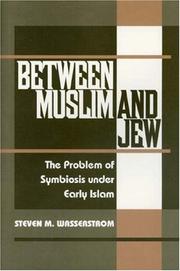
ISBN: 0691034559 1306984408 0691608970 1400864135 Year: 1995 Publisher: Princeton : Princeton University Press,
Abstract | Keywords | Export | Availability | Bookmark
 Loading...
Loading...Choose an application
- Reference Manager
- EndNote
- RefWorks (Direct export to RefWorks)
Steven Wasserstrom undertakes a detailed analysis of the "creative symbiosis" that existed between Jewish and Muslim religious thought in the eighth through tenth centuries. Wasserstrom brings the disciplinary approaches of religious studies to bear on questions that have been examined previously by historians and by specialists in Judaism and Islam. His thematic approach provides an example of how difficult questions of influence might be opened up for broader examination.In Part I, "Trajectories," the author explores early Jewish-Muslim interactions, studying such areas as messianism, professions, authority, and class structure and showing how they were reshaped during the first centuries of Islam. Part II, "Constructions," looks at influences of Judaism on the development of the emerging Shi'ite community. This is tied to the wider issue of how early Muslims conceptualized "the Jew." In Part III, "Intimacies," the author tackles the complex "esoteric symbiosis" between Muslim and Jewish theologies. An investigation of the milieu in which Jews and Muslims interacted sheds new light on their shared religious imaginings. Throughout, Wasserstrom expands on the work of social and political historians to include symbolic and conceptual aspects of interreligious symbiosis. This book will interest scholars of Judaism and Islam, as well as those who are attracted by the larger issues exposed by its methodology.Originally published in 1995.The Princeton Legacy Library uses the latest print-on-demand technology to again make available previously out-of-print books from the distinguished backlist of Princeton University Press. These editions preserve the original texts of these important books while presenting them in durable paperback and hardcover editions. The goal of the Princeton Legacy Library is to vastly increase access to the rich scholarly heritage found in the thousands of books published by Princeton University Press since its founding in 1905.
Islam --- Jews --- Judaism --- Relations --- Judaism. --- Intellectual life. --- Islam. --- History. --- Hebrews --- Israelites --- Jewish people --- Jewry --- Judaic people --- Judaists --- Ethnology --- Religious adherents --- Semites --- Religions --- Religion --- Adab (Islam). --- Ahmad al-Buni. --- Al-Amin. --- Al-Baladhuri. --- Al-Masudi. --- Allusion. --- Ancient Canaanite religion. --- Ancient Judaism (book). --- Arabic name. --- Arabs. --- Ark of the Covenant. --- B'nai Moshe. --- Bar Hebraeus. --- Baraita. --- Batiniyya. --- Berakhot (Talmud). --- Book of Daniel. --- Book of Leviticus. --- Comparative religion. --- Conversion to Judaism. --- Court Jew. --- Covenanter. --- Dual naming. --- Economy. --- Ethnic group. --- Ghulat. --- Halakha. --- Hanafi. --- Hebrew Bible. --- Hebrew name. --- Hermann Cohen. --- Homer. --- Husayn ibn Ali. --- Interfaith dialogue. --- Islam and the West. --- Islamic religious leaders. --- Islamic–Jewish relations. --- Israel. --- Israelites. --- Jewish Christian. --- Jewish diaspora. --- Jewish eschatology. --- Jewish history. --- Jewish leadership. --- Jewish mysticism. --- Jewish philosophy. --- Jewish prayer. --- Jewish religious movements. --- Jewish studies. --- Jews. --- Judah Halevi. --- Judeo-Christian. --- Julius Wellhausen. --- Karaite Judaism. --- Kitab al-Aghani. --- Kunya (Arabic). --- Law of Moses. --- Levantines (Latin Christians). --- Maimonides. --- Medium of exchange. --- Menahem. --- Merkava. --- Messianic Age. --- Messianism. --- Metatron. --- Moshe Gil. --- Muhammad ibn al-Hanafiyyah. --- Muslim. --- Muslims (nationality). --- Nation state. --- Norman Stillman. --- Persian Jews. --- Quran. --- Quraysh. --- Rabbinic Judaism. --- Reconstructionist Judaism. --- Religion. --- Religious text. --- Sectarianism. --- Sefer (Hebrew). --- Semitic people. --- Shema Yisrael. --- Shia Islam. --- Sikhism. --- Solomon Zeitlin. --- Solomon ibn Gabirol. --- Spread of Islam. --- Sunni Islam. --- Talmud. --- The Jews of Islam. --- Third Heaven. --- Tosefta. --- Trade route. --- Umma. --- Yazidis. --- Yemenite Jews. --- Zerubbabel. --- Zionism.
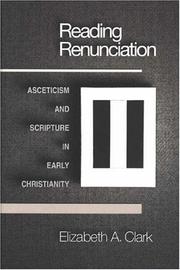
ISBN: 0691005117 0691005125 1400823188 1282753770 9786612753770 1400811244 9781400823185 1400801230 9780691005126 Year: 2001 Publisher: Princeton Princeton University Press
Abstract | Keywords | Export | Availability | Bookmark
 Loading...
Loading...Choose an application
- Reference Manager
- EndNote
- RefWorks (Direct export to RefWorks)
A study of how asceticism was promoted through Biblical interpretation, Reading Renunciation uses contemporary literary theory to unravel the writing strategies of the early Christian authors. Not a general discussion of early Christian teachings on celibacy and marriage, the book is a close examination, in the author's words, of how "the Fathers' axiology of abstinence informed their interpretation of Scriptural texts and incited the production of ascetic meaning." Elizabeth Clark begins with a survey of scholarship concerning early Christian asceticism that is designed to orient the nonspecialist. Section Two is organized around potentially troubling issues posed by Old Testament texts that demanded skillful handling by ascetically inclined Christian exegetes. The third section, "Reading Paul," focuses on the hermeneutical problems raised by I Corinthians 7, and the Deutero-Pauline and Pastoral Epistles. Elizabeth Clark's remarkable work will be of interest to scholars of late antiquity, religion, literary theory, and history.
248 "00/04" --- Asceticism --- -Ascetical theology --- Contempt of the world --- Theology, Ascetical --- Christian life --- Ethics --- Spiritualiteit. Ascese. Mystiek. Vroomheid--?"00/04" --- History --- -Asceticism --- Bible --- Criticism, interpretation, etc. --- Biblia --- Asceticism - History - Early church, ca 30-600 --- Acts of Paul and Thecla. --- Acts of Thomas. --- Adultery. --- Allegory. --- Ambrosiaster. --- Anchorite. --- Apologetics. --- Apostasy. --- Arianism. --- Asceticism. --- Basil of Ancyra. --- Basil of Caesarea. --- Bible. --- Body of Christ. --- Book of Judges. --- Book of Wisdom. --- Celibacy. --- Chastity. --- Christian Order. --- Christianity. --- Church Fathers. --- Clement of Alexandria. --- Clerical celibacy. --- Concupiscence. --- Consummation. --- Contra Celsum. --- Conversion to Christianity. --- Criticism of marriage. --- De fide. --- Dialogue with Trypho. --- Dispensation (canon law). --- Docetism. --- Donatism. --- Elijah. --- Epistle to the Ephesians. --- Evagrius Ponticus. --- Exegesis. --- Ezekiel. --- Fear of God. --- First Epistle to the Corinthians. --- Fornication. --- Gluttony. --- God. --- Helvidius. --- Heresy. --- Heterodoxy. --- Holiness code. --- Idolatry. --- Incest. --- Incorruptibility. --- Indulgence. --- Infidel. --- Jews. --- John Cassian. --- John Chrysostom. --- Jovinian. --- Judaizers. --- Justification (theology). --- Justin Martyr. --- Lactantius. --- Manichaeism. --- Marcion of Sinope. --- Marcionism. --- Matthew 25. --- Melania the Elder. --- Midrash. --- Monasticism. --- Montanism. --- New Testament. --- Old Testament. --- Origen. --- Paganism. --- Parable of the Great Banquet. --- Parable of the Ten Virgins. --- Paulinus of Nola. --- Pelagianism. --- Progressive revelation (Bahá'í). --- Rebuke. --- Religion. --- Religious text. --- Renunciation. --- Rule of Faith. --- Sacramentum (oath). --- Self-denial. --- Sexual Desire (book). --- Sexual abstinence. --- Sirach. --- Sola fide. --- Spiritual marriage. --- Spirituality. --- Spouse. --- Superiority (short story). --- Susanna (Book of Daniel). --- Tertullian. --- The City of God (book). --- Theodore of Mopsuestia. --- Theology. --- Thomas the Apostle. --- Thou shalt not commit adultery. --- Virginity.
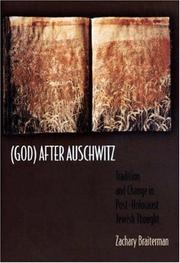
ISBN: 0691059411 9786612935213 1282935216 1400822769 1400811120 9781400811120 9780691059419 9781400822768 9781282935211 6612935219 Year: 1998 Publisher: Princeton, N.J. Princeton University Press
Abstract | Keywords | Export | Availability | Bookmark
 Loading...
Loading...Choose an application
- Reference Manager
- EndNote
- RefWorks (Direct export to RefWorks)
The impact of technology-enhanced mass death in the twentieth century, argues Zachary Braiterman, has profoundly affected the future shape of religious thought. In his provocative book, the author shows how key Jewish theologians faced the memory of Auschwitz by rejecting traditional theodicy, abandoning any attempt to justify and vindicate the relationship between God and catastrophic suffering. The author terms this rejection "Antitheodicy," the refusal to accept that relationship. It finds voice in the writings of three particular theologians: Richard Rubenstein, Eliezer Berkovits, and Emil Fackenheim. This book is the first to bring postmodern philosophical and literary approaches into conversation with post-Holocaust Jewish thought. Drawing on the work of Mieke Bal, Harold Bloom, Jacques Derrida, Umberto Eco, Michel Foucault, and others, Braiterman assesses how Jewish intellectuals reinterpret Bible and Midrash to re-create religious thought for the age after Auschwitz. In this process, he provides a model for reconstructing Jewish life and philosophy in the wake of the Holocaust. His work contributes to the postmodern turn in contemporary Jewish studies and today's creative theology.
Holocaust (Jewish theology). --- Judaism --- Theodicy. --- Holocaust (Jewish theology) --- -Theodicy --- Evil, Problem of (Theology) --- God --- Permissive will of God --- Problem of evil (Theology) --- Good and evil --- Theodicy --- Jews --- Religions --- Semites --- Permissive will --- Will, Permissive --- Religious aspects --- Religion --- Holocauste, 1939-1945 --- Théodicée --- Judaïsme --- Aspect religieux --- Histoire --- Judaism - 20th century. --- Judaism -- 20th century. --- Abraham Joshua Heschel. --- Absolute (philosophy). --- Aggadah. --- Agnon. --- Anguish. --- Antinomianism. --- Apocalyptic and post-apocalyptic fiction. --- Arnold Eisen. --- Atheism. --- Avi Weiss. --- Bible. --- Book of Deuteronomy. --- Book of Job. --- Book of Leviticus. --- Bruno Bettelheim. --- Buber. --- Censure. --- Christianity and antisemitism. --- Deity. --- Deuteronomist. --- Divine judgment. --- Elie Wiesel. --- Eliezer Berkovits. --- Elisha. --- Emil Fackenheim. --- Emil Nolde. --- Ephraim Urbach. --- Exegesis. --- Extermination camp. --- Finkelstein. --- Franz Rosenzweig. --- Gershom Scholem. --- God is dead. --- God. --- Good and evil. --- Hans-Georg Gadamer. --- Haredi Judaism. --- Hebrew Bible. --- Hermann Cohen. --- Hermeneutics. --- Hyperbole. --- Image of God. --- Isaac Luria. --- Israelites. --- Jewish history. --- Jewish philosophy. --- Jews. --- Job (biblical figure). --- Judaism. --- Judith Plaskow. --- Justification (theology). --- Kabbalah. --- Korah. --- Land of Israel. --- Leon Uris. --- Literature. --- Martin Buber. --- Martin Heidegger. --- Midrash. --- Mila 18. --- Mitzvah. --- Modernity. --- Mysticism. --- Narrative. --- Nazism. --- Omnibenevolence. --- Omnipotence. --- Philosopher. --- Philosophy. --- Postmodern philosophy. --- Postmodernism. --- Primo Levi. --- Princeton University Press. --- Problem of evil. --- Rabbi. --- Rabbinic Judaism. --- Rabbinic literature. --- Radical evil. --- Rebuke. --- Reform Judaism. --- Religion. --- Religious text. --- Rhetoric. --- Rhetorical device. --- Righteousness. --- Rosenzweig. --- Scholem. --- Soloveitchik. --- Sources of the Self. --- Steven Zipperstein. --- Supervisor. --- The Exodus. --- The History of Sexuality. --- Theism. --- Theology. --- Thought. --- Torah. --- Wissenschaft des Judentums. --- Writing.
Book
ISBN: 1400846587 9781400846580 9780691150826 0691150826 0691168083 Year: 2013 Publisher: Princeton [N.J.] Princeton University Press
Abstract | Keywords | Export | Availability | Bookmark
 Loading...
Loading...Choose an application
- Reference Manager
- EndNote
- RefWorks (Direct export to RefWorks)
From the first centuries of Islam to well into the Middle Ages, Jews and Christians produced hundreds of manuscripts containing portions of the Bible in Arabic. Until recently, however, these translations remained largely neglected by Biblical scholars and historians. In telling the story of the Bible in Arabic, this book casts light on a crucial transition in the cultural and religious life of Jews and Christians in Arabic-speaking lands. In pre-Islamic times, Jewish and Christian scriptures circulated orally in the Arabic-speaking milieu. After the rise of Islam--and the Qur'an's appearance as a scripture in its own right--Jews and Christians translated the Hebrew Bible and the Greek New Testament into Arabic for their own use and as a response to the Qur'an's retelling of Biblical narratives. From the ninth century onward, a steady stream of Jewish and Christian translations of the Hebrew Bible and New Testament crossed communal borders to influence the Islamic world. The Bible in Arabic offers a new frame of reference for the pivotal place of Arabic Bible translations in the religious and cultural interactions between Jews, Christians, and Muslims.Some images inside the book are unavailable due to digital copyright restrictions.
Muslims. --- Religion --- Biblical Reference --- Concordances. --- Language Study. --- Islam --- General. --- Bible. --- Versions --- History. --- 22.05*46 --- Bijbel: Arabische oude vertalingen --- 22.05*46 Bijbel: Arabische oude vertalingen --- 297.181*1 --- 297.181*1 Koran en Bijbel --- Koran en Bijbel --- History --- RELIGION / History. --- Mohammedans --- Moors (People) --- Moslems --- Muhammadans --- Musalmans --- Mussalmans --- Mussulmans --- Mussulmen --- Religious adherents --- Al-Andalus. --- Allusion. --- Alphonse Mingana. --- Anno Domini. --- Apocalypse of Peter. --- Apologetics. --- Arab Christians. --- Arabic alphabet. --- Arabic script. --- Arabic. --- Arabs. --- Bible translations. --- Biblical criticism. --- Book of Job. --- Caliphate. --- Cambridge University Press. --- Christian literature. --- Christian scripture. --- Christian theology. --- Christian tradition. --- Christian. --- Christianity and Judaism. --- Christianity. --- Christology. --- Church of the East. --- Classical Arabic. --- Copts. --- Crucifixion of Jesus. --- Diatessaron. --- Early Muslim conquests. --- Early Period. --- Epithet. --- Evocation. --- Exegesis. --- Ghassanids. --- God the Father. --- God. --- Hebrew Bible. --- Hebrew language. --- Ibn Qutaybah. --- Islam. --- Islamic culture. --- Israelites. --- Jewish Christian. --- Jewish culture. --- Jews. --- John the Baptist. --- Judaism. --- Kafir. --- Late Antiquity. --- Law of Moses. --- Lectionary. --- Literature. --- Manichaeism. --- Melkite. --- Modern Standard Arabic. --- Muslim world. --- Muslim. --- Nestorianism. --- New Testament. --- Old Arabic. --- Old Testament. --- Oxford University Press. --- Patriarchs (Bible). --- Patricia Crone. --- Patrologia Orientalis. --- Pauline epistles. --- People of the Book. --- Pericope. --- Peshitta. --- Polemic. --- Pre-Islamic Arabia. --- Preface (liturgy). --- Princeton University Press. --- Prophecy. --- Prophets and messengers in Islam. --- Prophets of Christianity. --- Psalms. --- Quran. --- Rabbi. --- Religion. --- Religious conversion. --- Religious text. --- Routledge. --- Salvation History. --- Septuagint. --- Sermon on the Mount. --- Spread of Islam. --- Syriac language. --- The Christian Community. --- Theology. --- Tiberias. --- Torah. --- Translation Movement. --- Ummah. --- Vulgate. --- Writing. --- Zoroaster. --- Zoroastrianism.
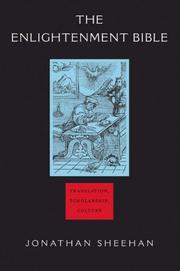
ISBN: 9780691130699 0691130698 0691118876 1400847796 9781400847792 9780691118871 Year: 2007 Publisher: Princeton, N.J. ; Woodstock : Princeton University Press,
Abstract | Keywords | Export | Availability | Bookmark
 Loading...
Loading...Choose an application
- Reference Manager
- EndNote
- RefWorks (Direct export to RefWorks)
How did the Bible survive the Enlightenment? In this book, Jonathan Sheehan shows how Protestant translators and scholars in the eighteenth century transformed the Bible from a book justified by theology to one justified by culture. In doing so, the Bible was made into the cornerstone of Western heritage and invested with meaning, authority, and significance even for a secular age. The Enlightenment Bible offers a new history of the Bible in the century of its greatest crisis and, in turn, a new vision of this century and its effects on religion. Although the Enlightenment has long symbolized the corrosive effects of modernity on religion, Sheehan shows how the Bible survived, and even thrived in this cradle of ostensible secularization. Indeed, in eighteenth-century Protestant Europe, biblical scholarship and translation became more vigorous and culturally significant than at any time since the Reformation. From across the theological spectrum, European scholars--especially German and English--exerted tremendous energies to rejuvenate the Bible, reinterpret its meaning, and reinvest it with new authority. Poets, pedagogues, philosophers, literary critics, philologists, and historians together built a post-theological Bible, a monument for a new religious era. These literati forged the Bible into a cultural text, transforming the theological core of the Judeo-Christian tradition. In the end, the Enlightenment gave the Bible the power to endure the corrosive effects of modernity, not as a theological text but as the foundation of Western culture.
Enlightenment.
---
Siècle des lumières
---
Bible.
---
History.
---
-Enlightenment.
---
Aufklärung
---
Eighteenth century
---
Philosophy, Modern
---
Rationalism
---
Bible
---
History
---
Enlightenment
---
#GGSB: Exegese
---
22.06 <09>
---
Bijbel: exegese--
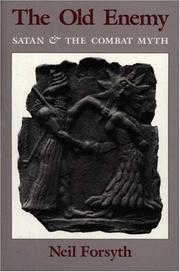
ISBN: 0691067120 0691214603 Year: 1987 Publisher: Princeton, N.J. : Princeton University Press,
Abstract | Keywords | Export | Availability | Bookmark
 Loading...
Loading...Choose an application
- Reference Manager
- EndNote
- RefWorks (Direct export to RefWorks)
The description for this book, The Old Enemy: Satan and the Combat Myth, will be forthcoming.
Devil --- Devil in literature. --- Theomachy. --- Comparative studies. --- History of doctrines. --- Geistesgeschichte Anfänge-500. --- Gott. --- Teufel. --- Djävulen. --- Devil. --- Satan. --- Devil in literature --- History and criticism. --- Beelzebub --- Beelzebul --- Lucifer --- Satan --- Satanael --- Satanail --- Demonology --- Devil as literary characters --- Gotteslehre --- Götter --- Göttin --- Gottesbeweis --- Übernatürliches Wesen --- Luzifer --- Ahura Mazda. --- Allegory. --- Allusion. --- Apocalypse of Adam. --- Apocalyptic literature. --- Apostasy. --- Ashurbanipal. --- Atheism. --- Belial. --- Book of Job. --- Book of Revelation. --- Canaan. --- Christ. --- Christian mythology. --- Christian theology. --- Christian tradition. --- Christian. --- Christianity. --- Church Fathers. --- Cosmogony. --- Covenant theology. --- Creation myth. --- Deity. --- Demiurge. --- Dualism. --- Egyptians. --- Elohim. --- End time. --- Enkidu. --- Enlil. --- Epic of Gilgamesh. --- Epic poetry. --- Epistle to the Ephesians. --- Exegesis. --- Exorcism. --- Ezekiel. --- Fall of man. --- Fallen angel. --- False prophet. --- Flood myth. --- Fornication. --- Gnosticism. --- God. --- Good and evil. --- Greek mythology. --- Hebrew Bible. --- Heresy. --- Humbaba. --- Image of God. --- Irenaeus. --- Israelites. --- Jews. --- Judaism. --- Justin Martyr. --- Life of Adam and Eve. --- Literature. --- Manichaeism. --- Marcion of Sinope. --- Marduk. --- Midrash. --- Monotheism. --- Narrative. --- Neoplatonism. --- New Testament. --- Ninurta. --- Old Testament. --- Omnipotence. --- Origen. --- Pelagianism. --- Philosopher. --- Poetry. --- Polemic. --- Protevangelium. --- Psalms. --- Rahab. --- Religion. --- Religious text. --- Righteousness. --- Samael. --- Samyaza. --- Satanism. --- Sect. --- Septuagint. --- Serpents in the Bible. --- Sheol. --- Sodom and Gomorrah. --- Stumbling block. --- Synoptic Gospels. --- Tertullian. --- The Other Hand. --- Theology. --- Tiamat (Dungeons & Dragons). --- Tiamat. --- Ugarit. --- Wickedness. --- Writing. --- Yahweh. --- Yamm. --- Zoroastrianism.
Book
ISBN: 9781400887972 1400887976 9780691139098 Year: 2017 Publisher: Princeton, NJ : Princeton University Press,
Abstract | Keywords | Export | Availability | Bookmark
 Loading...
Loading...Choose an application
- Reference Manager
- EndNote
- RefWorks (Direct export to RefWorks)
A pathbreaking history of Sufism, from the earliest centuries of Islam to the presentAfter centuries as the most important ascetic-mystical strand of Islam, Sufism saw a sharp decline in the twentieth century, only to experience a stunning revival in recent decades. In this comprehensive new history of Sufism from the earliest centuries of Islam to today, Alexander Knysh, a leading expert on the subject, reveals the tradition in all its richness.Knysh explores how Sufism has been viewed by both insiders and outsiders since its inception. He examines the key aspects of Sufism, from definitions and discourses to leadership, institutions, and practices. He devotes special attention to Sufi approaches to the Qur'an, drawing parallels with similar uses of scripture in Judaism and Christianity. He traces how Sufism grew from a set of simple moral-ethical precepts into a sophisticated tradition with professional Sufi masters (shaykhs) who became powerful players in Muslim public life but whose authority was challenged by those advocating the equality of all Muslims before God. Knysh also examines the roots of the ongoing conflict between the Sufis and their fundamentalist critics, the Salafis-a major fact of Muslim life today.Based on a wealth of primary and secondary sources, Sufism is an indispensable account of a vital aspect of Islam.
Mysticism --- RELIGION / Islam / General. --- Sufism --- Sufism. --- Islam --- History. --- Islam. --- Dark night of the soul --- Mystical theology --- Theology, Mystical --- Spiritual life --- Negative theology --- Abrahamic religions. --- Al-Ghazali. --- Al-Qushayri. --- Asceticism. --- Author. --- Bernard McGinn (theologian). --- Bruce Lincoln. --- Christian mysticism. --- Christianity and Islam. --- Christianity. --- Christopher Melchert. --- Dhikr. --- Dichotomy. --- Divine presence. --- Doctrine. --- Edward Said. --- Esoteric interpretation of the Quran. --- Exegesis. --- Fear of God. --- Fiqh. --- Font Bureau. --- God. --- Hadith. --- Heresy. --- Historiography. --- Ibn Khaldun. --- Ibn Taymiyyah. --- Idolatry. --- Illustration. --- Irfan. --- Islamic culture. --- Islamic fundamentalism. --- Islamic holy books. --- Islamic studies. --- Jews. --- Judaism. --- Judeo-Christian. --- Justification (theology). --- Kafir. --- Kashf. --- Literature. --- Louis Massignon. --- Mansur Al-Hallaj. --- Modernity. --- Monasticism. --- Mosque. --- Muhammad. --- Murid. --- Muslim world. --- Muslim. --- Mystical theology. --- Mysticism. --- Najm al-Din. --- Naqshbandi. --- Narrative. --- Occult. --- Orientalism. --- Orthodoxy. --- P. J. Conkwright. --- Persecution. --- Philosopher. --- Philosophy. --- Physician. --- Piety. --- Plotinus. --- Polemic. --- Political correctness. --- Presence of God (Catholicism). --- Princeton University Press. --- Pseudo-Dionysius the Areopagite. --- Quran. --- Religion. --- Religious studies. --- Religious text. --- Renunciation. --- Sadr al-Din al-Qunawi. --- Saint. --- Salafi movement. --- Sayyid. --- Sheikh. --- Silsila. --- Sufi cosmology. --- Sufi metaphysics. --- Sufi studies. --- Sunni Islam. --- Tariqa. --- The Sufis. --- Theology. --- Treatise. --- Ulama. --- Umberto Eco. --- Ummah. --- Wahhabism. --- William Chittick. --- World to come. --- World view. --- Worship. --- Writing.
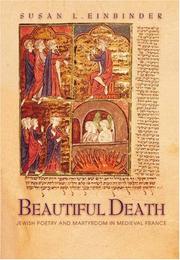
ISBN: 1282157787 9786612157783 1400825253 9781400825257 9780691090535 069109053X 069109053X Year: 2002 Publisher: Princeton, N.J. Princeton University Press
Abstract | Keywords | Export | Availability | Bookmark
 Loading...
Loading...Choose an application
- Reference Manager
- EndNote
- RefWorks (Direct export to RefWorks)
When Crusader armies on their way to the Holy Land attacked Jewish communities in the Rhine Valley, many Jews chose suicide over death at the hands of Christian mobs. With their defiant deaths, the medieval Jewish martyr was born. With the literary commemoration of the victims, Jewish martyrology followed. Beautiful Death examines the evolution of a long-neglected corpus of Hebrew poetry, the laments reflecting the specific conditions of Jewish life in northern France. The poems offer insight into everyday life and into the ways medieval French Jews responded to persecution. They also suggest that poetry was used to encourage resistance to intensifying pressures to convert. The educated Jewish elite in northern France was highly acculturated. Their poetry--particularly that emerging from the innovative Tosafist schools--reflects their engagement with the vernacular renaissance unfolding around them, as well as conscious and unconscious absorption of Christian popular beliefs and hagiographical conventions. At the same time, their extraordinary poems signal an increasingly harsh repudiation of Christianity's sacred symbols and beliefs. They reveal a complex relationship to Christian culture as Jews internalized elements of medieval culture even while expressing a powerful revulsion against the forms and beliefs of Christian life. This gracefully written study crosses traditional boundaries of history and literature and of Jewish and general medieval scholarship. Focusing on specific incidents of persecution and the literary commemorations they produced, it offers unique insights into the historical conditions in which these poems were written and performed.
Jews --- Judaism --- Martyrdom --- Martyrdom in literature. --- Hebrew literature, Medieval --- Hebrews --- Israelites --- Jewish people --- Jewry --- Judaic people --- Judaists --- Ethnology --- Religious adherents --- Semites --- Religions --- Martyrdom (Judaism) --- Persecutions --- History --- Judaism. --- History and criticism. --- Religion --- Abraham ibn Ezra. --- Allusion. --- Apostasy. --- Ashkenaz. --- Blood libel. --- Book burning. --- Book of Ezekiel. --- Books of Kings. --- Christian literature. --- Christianity. --- Conversion to Christianity. --- Conversion to Judaism. --- Crusades. --- Defection. --- Desecration. --- Desperation (novel). --- Elohim. --- Emeritus. --- Exegesis. --- Ezekiel. --- First Crusade. --- Gershom. --- God. --- Hagigah. --- Hagiography. --- Halevi. --- Harassment. --- Hazzan. --- Hebrew Bible. --- Hebrew language. --- Heresy. --- High Middle Ages. --- Historian. --- Host desecration. --- Humiliation. --- Illustration. --- In Death. --- Incorruptibility. --- Israelites. --- Jewish identity. --- Jewish studies. --- Jews. --- Kohen. --- Lament. --- Lamentations Rabbah. --- Laments (Kochanowski). --- Libation. --- Literature. --- Maimonides. --- Martyr. --- Martyrology. --- Medieval Hebrew. --- Meir of Rothenburg. --- Middle Ages. --- Mishnah. --- Nahmanides. --- Names of God in Judaism. --- Narrative. --- Old French. --- Penitential. --- Persecution. --- Piyyut. --- Poetry. --- Polemic. --- Princeton University. --- Prose. --- Psalms. --- Pyre. --- Quatrain. --- Rabbi. --- Rabbinic literature. --- Rashbam. --- Rashi. --- Relic. --- Religious text. --- Responsa. --- Righteousness. --- Second Crusade. --- Sefer (Hebrew). --- Sefer Hasidim. --- Simhah. --- Soloveitchik. --- Stanza. --- Suffering. --- Suggestion. --- Talmud. --- Tefillin. --- Ten Martyrs. --- The Other Hand. --- The Song of Roland. --- Torah scroll. --- Torah. --- Treatise. --- Troyes. --- V. --- Writer. --- Writing. --- Yechiel of Paris. --- Yom Tov of Joigny.
| Listing 1 - 10 of 11 | << page >> |
Sort by
|

 Search
Search Feedback
Feedback About
About Help
Help News
News